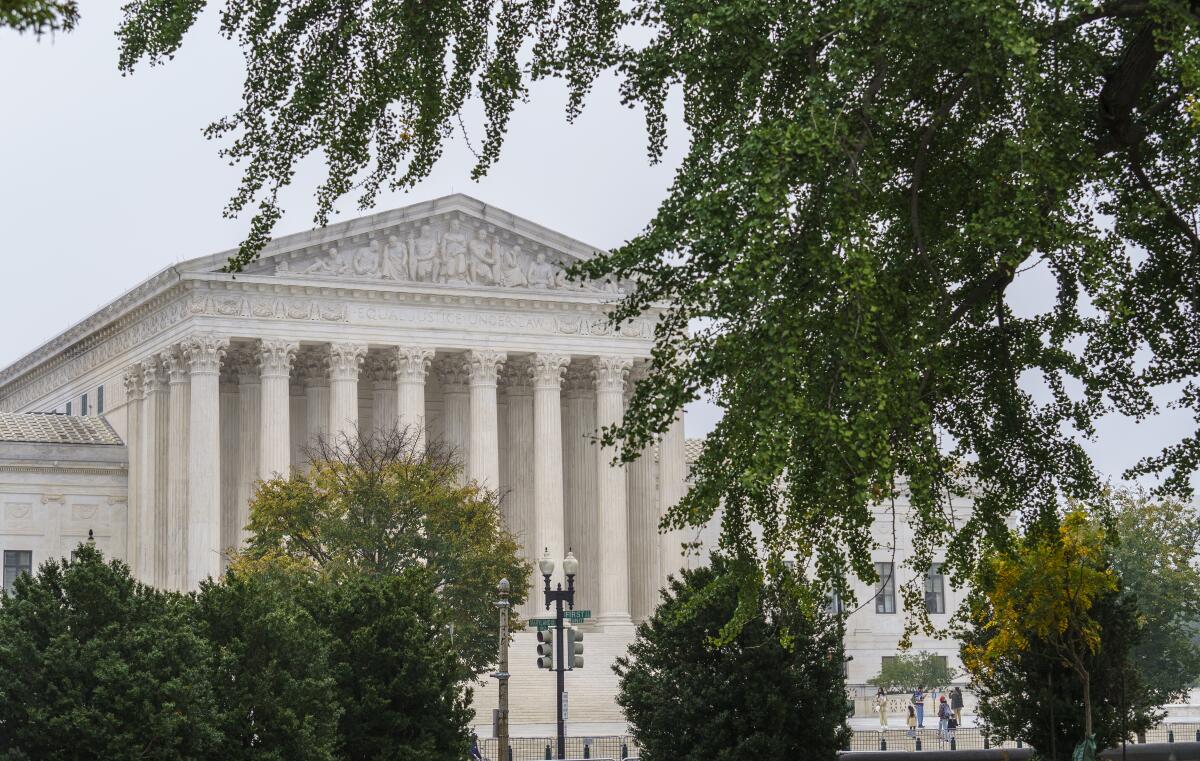Biden administration urges Supreme Court to suspend Texas abortion law

The Biden administration on Monday asked the Supreme Court to intervene and suspend a Texas law that has banned most abortions there.
The Justice Department filed an emergency appeal that asks the justices to put the Texas law on hold and to eventually declare it unconstitutional.
The move, while expected, sets the stage for another battle over abortion before a more conservative court.
On Dec. 1, the court will hear arguments in a case from Mississippi, which adopted a 15-week limit on abortion. The state’s lawyers are asking the court to overturn the 1973 ruling Roe vs. Wade and the right to abortion.
In Monday’s appeal, the acting solicitor general said the high court should not allow a state to ignore its past rulings, which have repeatedly said pregnant women may choose abortion up to the point of fetus viability, usually considered about 24 weeks. He said a district judge in Austin had properly suspended enforcement of the Texas law.
On Thursday, the 5th Circuit by a 2-1 vote issued a one-paragraph order setting aside that ruling.
The Texas Heartbeat Act, known also as SB 8, makes it illegal for doctors to perform abortions after six weeks of pregnancy, but its enforcement was left to private lawsuits.
The administration’s appeal raises a significant question of legal procedure. At issue is whether the U.S. government can sue a state for violating the constitutional rights of its people.
Shortly after the Justice Department filed its emergency request, the court asked for a response from Texas by Thursday. It would take the votes of five justices to suspend the Texas law.
They previously split 5-4 in early September when first refusing to prevent the Texas law from taking effect.
The conservative majority said the case presents “complex and novel antecedent procedural questions.” Chief Justice John G. Roberts Jr., in dissent, said the court should have put the law on hold while judges weighed those questions.
In Monday’s appeal, acting Solicitor Gen. Brian Fletcher suggested another option. He said the court should consider granting a full review of the unusual Texas law now.
“The fundamental question presented in this case is whether states may nullify disfavored constitutional rights by purporting to disclaim their own enforcement authority and delegating enforcement of unconstitutional laws to private bounty hunters,” he wrote in United States vs. Texas. “SB 8’s use of that scheme has already allowed Texas to nullify this court’s precedents for six weeks. That state of affairs should not be allowed to persist — or spread to other states or other rights — without this court’s review.”
Fletcher also said Texas and its lawyers have no grounds to complain that the state will suffer “irreparable harm” if the law is put on hold — since the state “has labored to distance itself from the law,” he said. “If Texas is to be believed, the state has no responsibility for SB 8 or its operation.”
But so far, the measure has succeeded in throwing up procedural obstacles in front of abortion-rights advocates.
Ever since the Roe decision — which was also centered on a Texas law — the high court has held that states may not prohibit pregnant women from obtaining an abortion prior to the time the fetus is viable.
But that still-standing constitutional right to abortion has not prevented Texas from enforcing a new law that makes it illegal for doctors to perform most abortions.
When abortion providers sued in August to block the Texas law from taking effect, they ran into two procedural barriers. First, the state could not be sued directly for adopting an unconstitutional law because states have a “sovereign immunity” that shields them being sued in federal court by individuals — or so the Supreme Court said in 1890.
Second, Texas officials could not be sued for enforcing the new law because they had no role in enforcing it. Instead, the novel law used a type of bounty-hunter provision, authorizing private individuals to step forward and sue those who participate in an illegal abortion, and collect $10,000 or more for doing so.
That threat was enough to force most abortion providers to stop performing procedures after six weeks.
After the court declined to block the law, the Justice Department sued Texas, noting that the states are not shielded from lawsuits filed by the federal government. It sought a ruling that would declare the Texas law unconstitutional and suspend its enforcement.
“The United States has the authority and responsibility to ensure that no state can deprive individuals of their constitutional rights through a legislative scheme specifically designed to prevent the vindication of those rights,” Atty. Gen. Merrick Garland said in announcing the suit. “This kind of scheme to nullify the Constitution of the United States is one that all Americans — whatever their politics or party — should fear. If it prevails, it may become a model for action in other areas, by other states, and with respect to other constitutional rights and judicial precedents.”
The suit went before U.S. District Judge Robert Pitman in Austin, an Obama appointee. And after hearing arguments from both sides, he issued a 113-page opinion on Oct. 6 that explained why the Texas abortion ban is unconstitutional and why the U.S. government had the authority to challenge it in court.
His order decision was set aside by the 5th Circuit.
“The Supreme Court needs to step in and stop this madness,” said Nancy Northup, president of the Center for Reproductive Rights. “It’s unconscionable that the 5th Circuit stayed such a well-reasoned decision that allowed constitutionally protected services to return in Texas.”
More to Read
Get the L.A. Times Politics newsletter
Deeply reported insights into legislation, politics and policy from Sacramento, Washington and beyond. In your inbox three times per week.
You may occasionally receive promotional content from the Los Angeles Times.







